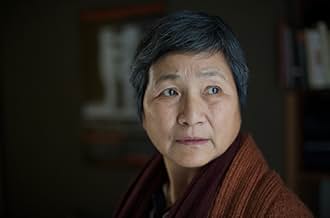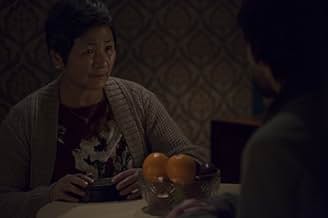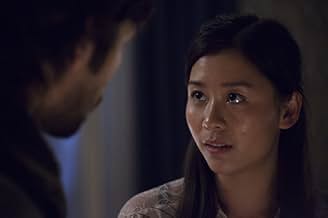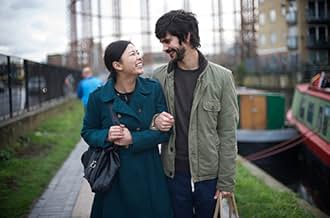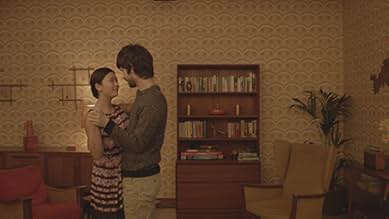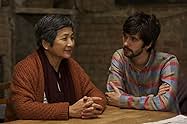A young man of French, Chinese, and Cambodian descent dies, leaving behind his isolated mother and his 4-year male lover, who grieve but don't speak a lick of each other's language.A young man of French, Chinese, and Cambodian descent dies, leaving behind his isolated mother and his 4-year male lover, who grieve but don't speak a lick of each other's language.A young man of French, Chinese, and Cambodian descent dies, leaving behind his isolated mother and his 4-year male lover, who grieve but don't speak a lick of each other's language.
- Nominated for 1 BAFTA Award
- 4 wins & 7 nominations total
- Junn
- (as Cheng Pei Pei)
- Vann
- (as Naomi Christie)
- Waiter
- (uncredited)
- Cafe customer
- (uncredited)
- Elderly Resident
- (uncredited)
- Café Customer
- (uncredited)
- Director
- Writer
- All cast & crew
- Production, box office & more at IMDbPro
Featured reviews
It was easy to forget that you were watching actors. The performances were that good and very moving. It was very much like a French film.
It was interesting how much back-story was left out and yet it still worked. I asked myself a few questions because I wanted to know more. (Perhaps I felt I could help.) Where were we? (North-east London/Essex?) How long had she lived in England by depending on her husband and son for all communication with the outside world? What did people do for a living? Where did the translator come from and was she being paid? Without her son would she at last break out into the world? However I realised the back-story didn't matter. It told you all you needed to know. The nub was all that mattered: an insight into communication, memory and grief. Some things have to be said and some things are perhaps best left unsaid. The characters kept asking the translator not to translate after they had said something because they had time to see the effect it would have, (something that does not happen with a common language) but even the translator could not help but get involved.
You could speculate on a happier outcome but the final scene where she drifted back to the last meeting with her son perhaps indicated it would be a while yet before she could move on.
Very, very good.
"Lilting" is an ambitious attempt to portray the cultural differences at play in a modern relationship. The story places a lot of emphasis on the filial duties of a Chinese child, and the anger of the mother whose son does not fulfill the supposed filial duties. This is surely mystifying to Western viewers, and the film does not really explain it that clearly. As I do understand this cultural context, I empathise with the story.
Two things that bug me though, is that Kai looks so Caucasian. I have huge trouble in believing that he is only a quarter English. The second thing is that the mother says he feels lonely during Christmas, which is clearly a line aimed at Western viewers because she would the most likely not be celebrating Christmas. She would be way more likely to feel lonely during Chinese New Year.
Overall, "Lilting" is not for everyone. The pacing is slow, but if you understand the cultural subtext then you will empathise with the story a lot.
However Hong Khaou's film looks at the difficulties of communication at a much deeper level than the purely linguistic. He invites us to reflect on the wisdom of Kai's decision to put his mother in sheltered accommodation, whose dingy décor is designed to make elderly people 'feel better.' Despite Richard's basic kindness and his protestations of endless love for Kai, we wonder whether he actually understand what either Kai or Junn actually think. Maybe it's not really necessary to hire a translator: communication between individuals can take place at a subliminal level. Vann does her best to act as an intermediary between Junn and Richard, or Junn and Alan, but it's clear that her role is a peripheral one in the drama of familial relationships across cultures.
Shot in deliberately dark colors, LILTING depicts a world whose protagonists live in perpetual isolation, both literal as well as psychological. Junn's sheltered accommodation is both dark and prison-like; her fellow-residents seldom communicate except in clichés (Alan included). Richard's apartment is full of long, brick-lined passages; his kitchen is full of dirty cutlery, suggesting a fundamental inability to cope with life.
Our relationship with the two central protagonists is a complex one. Whishaw tries his best to render Richard a sympathetic character, but the more effort he makes to try and bridge the cultural differences separating himself from Junn, the more frustrated he becomes. His final outburst, where he accuses Junn of failing to "assimilate" to contemporary British cultures, is a classic colonialist statement, leaving us to reflect on why he himself did not do more to adapt himself to her mores. By contrast Junn remains both silent and serene; her final soliloquy reveals her determination to continue her existence, despite the prospect of future loneliness. She does not need to "assimilate"; she has found her own way to negotiate the culture she inhabits.
Modestly budgeted yet memorably staged by a director with an obvious affinity for the material, LILTING is an absorbing cinematic experience.
In many Wong Kar Wai films the actors speak to each other in different languages with seeming full understanding. It suggests a disjuncture between time, place and culture, where language, usually the unifying factor within the narrative, becomes the source of each character's isolation. Lilting is self-conscious in its language play and it works powerfully to both comic and emotional effect. This has the magic effect of bending time. Locations are practically sparse, but the film gives the feeling of having moved us quite literally around the world.
The film demonstrates that with translation, there is always something essential that is lost. This might be cultural sensitivity, the feeling that we understand when, actually, we do not. Thus, it questions the assumptions we all make. It might also be the feeling that we know something or someone when actually we do not.
This may sound a heady, difficult mix. Far from it.
The film is beautifully shot, and again we experience something of the camera work of Christopher Doyle (Wong Kar Wai's leading cinematographer) in the delicate and soft palate of colours, and subtlety of framing which are as evocative as the language play in evoking mood and location. Nothing is wasted in this film. Even landmark pieces of music (another Wong motif) sit perfectly within the cross cultural narrative.
This is a film I will watch again and not simply for the references to Wong Kar Wai, It's a seamless depiction of loss in a world of seeming falling borders.
I hope you enjoy the film as much as I have.
Did you know
- TriviaFilmed in 3 weeks.
- GoofsAt the scene when Ben Whishaw and Andrew Leung were on bed, Ben says "You're really gonna do that?", but his lips don't move.
- Quotes
Junn: Through plenty of crying, I've learnt to be content that I won't always be happy, secure in my loneliness, hopeful that I will be able to cope. Every year on Christmas Day I get very lonely. An incredible feeling of solitude. On this day, everything has stood still, even the trees have stopped rustling, but I'm still moving, I want to move, but I have nothing to move to, and nowhere to go. The scars beneath my skin suddenly surface and I get scared. Scared of being alone.
- ConnectionsFeatured in Lilting: Deleted Scene (2014)
- SoundtracksYe Lai Xiang
Performed by Xiang Lan Li
- How long is Lilting?Powered by Alexa
Details
Box office
- Gross US & Canada
- $27,054
- Opening weekend US & Canada
- $1,567
- Sep 28, 2014
- Gross worldwide
- $247,377
- Runtime
- 1h 23m(83 min)
- Color
- Aspect ratio
- 2.35 : 1








